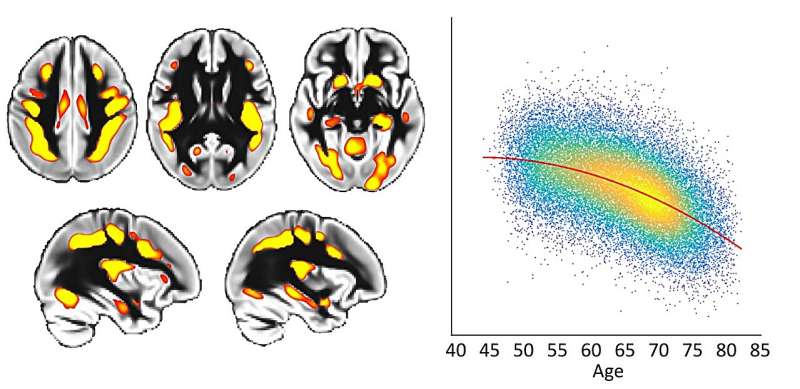This article has been reviewed according to Science X's editorial process and policies. Editors have highlighted the following attributes while ensuring the content's credibility:
fact-checked
peer-reviewed publication
trusted source
proofread
Risk factors for faster aging in the brain revealed in new study

In a new study published in Nature Communications, researchers investigated the genetic and modifiable influences on fragile brain regions by looking at the brain scans of 40,000 UK Biobank participants aged over 45.
Previously, the researchers had identified a 'weak spot' in the brain, which is a specific network of higher-order regions that not only develop later during adolescence, but also show earlier degeneration in old age. They showed that this brain network is also particularly vulnerable to schizophrenia and Alzheimer's disease.
In their latest study, the researchers examined 161 risk factors for dementia, and ranked their impact on this vulnerable brain network, over and above the natural effects of age.
They classified these so-called 'modifiable' risk factors—as they can potentially be changed throughout life to reduce the risk of dementia—into 15 broad categories: blood pressure, cholesterol, diabetes, weight, alcohol consumption, smoking, depressive mood, inflammation, pollution, hearing, sleep, socialization, diet, physical activity, and education.
Prof. Gwenaëlle Douaud, who led this study, said, "We know that a constellation of brain regions degenerates earlier in aging, and in this new study we have shown that these specific parts of the brain are most vulnerable to diabetes, traffic-related air pollution—increasingly a major player in dementia—and alcohol, of all the common risk factors for dementia.
"We have found that several variations in the genome influence this brain network, and they are implicated in cardiovascular deaths, schizophrenia, Alzheimer's and Parkinson's diseases, as well as with the two antigens of a little-known blood group, the elusive XG antigen system, which was an entirely new and unexpected finding."
Prof. Lloyd Elliott, a co-author from Simon Fraser University in Canada, concurs, "In fact, two of our seven genetic findings are located in this particular region containing the genes of the XG blood group, and that region is highly atypical because it is shared by both X and Y sex chromosomes. This is really quite intriguing as we do not know much about these parts of the genome; our work shows there is benefit in exploring further this genetic terra incognita."
Importantly, as Prof. Anderson Winkler, a co-author from the National Institutes of Health and The University of Texas Rio Grande Valley in the U.S., points out, "What makes this study special is that we examined the unique contribution of each modifiable risk factor by looking at all of them together to assess the resulting degeneration of this particular brain 'weak spot.'
"It is with this kind of comprehensive, holistic approach—and once we had taken into account the effects of age and sex—that three emerged as the most harmful: diabetes, air pollution, and alcohol."
This research sheds light on some of the most critical risk factors for dementia, and provides novel information that can contribute to prevention and future strategies for targeted intervention.
More information: The effects of genetic and modifiable risk factors on brain regions vulnerable to ageing and disease, Nature Communications (2024). DOI: 10.1038/s41467-024-46344-2




















